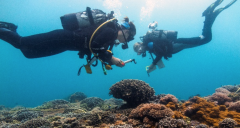
Research of the Marine Animal Ecology group
Marine Animal Ecology investigates how animals adapt to their (changing) environment. The projects comprise all levels of biological integration, from cell to ecosystem.
Our research lines
-
Biodiversity
Biodiversity is a measurement of variation that can be assessed at the genetic, species and ecosystem level. At Marine Animal Ecology we perform fundamental research to answer questions such as how biodiversity is generated and maintained and what the underlying processes are. We also develop monitoring tools to adequately assess diversity.
-

Climate change
Marine ecosystems are challenged by various aspects of climate change. In order for ecosystems to persist they need to be resilient: able to absorb and withstand stress, maintain function and, if necessary, evolve into configurations that are able to thrive. Marine Animal Ecology aims to increase climate resilience of reefs through understanding how organisms respond to change and how we can best protect them.
-

Local stressors
Apart from global stressors such as climate change with associated sea surface temperature rise and ocean acidification, there are also many local stressors affecting the health marine organisms. Leaking of electro-magnetic fields from subsea power cables, oil spills, and heavy metals are just to name but a few. Marine Animal Ecology studies the effect of these stressors on marine life through various experiments.
-

Nature-based solutions
To counterbalance detrimental effects of anthropogenic influences on coral reefs, efforts are taken to provide nature-based solutions. Restoration efforts can take the form of rearing coral fragments in nurseries or placing artificial structures to promote benthic and pelagic biodiversity. Another aspect of habitat restoration is the genetic health and resilience of transplanted coral fragments. Marine Animal Ecology works in Kenya, the Dutch Caribbean and the North Sea on various restoration projects.